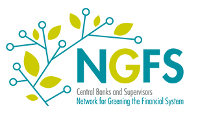
Financial institutions strive for economic stability but climate-related risks could have large impacts that may result in high costs. Therefore, science-based information is critical for sound decision-making; mutual learning between climate scenario modelers and central bankers is more important than ever before. The IIASA ECE Program is involved in several activities to help global finance go green and to improve the representation of the finance sector in global climate scenarios.
NGFS Climate Scenarios
IIASA is part of a scientific consortium to provide climate scenarios to the Network for Greening the Financial System (NGFS) and hosts the NGFS Scenario Explorer for financial users around the world. The NGFS is a group of 121 central banks and financial supervisors committed to sharing best practices, contributing to the development of climate– and environment–related risk management in the financial sector and mobilizing mainstream finance to support the transition toward a sustainable economy. The transition scenarios that are published annually by IIASA and partners explore future changes to the energy system and the global economy if climate targets are met or not, and whether the transition to a low-carbon future happens in an orderly or disorderly fashion.
Representing the finance sector in climate scenarios
IIASA’s ECE program pioneers the representation of the finance sector in climate scenarios. A new framework has been developed to couple integrated assessment models with models that simulate climate financial risk. Current activities focus on operationalizing such framework with the MESSAGEix-GLOBIOM model and the development of long-term scenario narratives for the finance sector.
Aligning sectoral ambitions with global targets
Emission mitigation plans are increasingly put forward at the level of individual sectors and companies. The scale of these projections does not always match with the globally comprehensive projections in climate scenarios, making it difficult to assess whether the ambitions are aligned with climate targets. IIASA’s ECE program collaborates with the Potsdam Institute for Climate Impacts Research (PIK), the UN Environment Finance Initiative (UNEP-FI) and the Glasgow Alliance for Net Zero (GFANZ) to develop a webtool that allows for the assessment of sectoral emission targets in the context of global climate scenarios.
Climate scenarios for financial risk assessment
IIASA's ECE Program plays a key role in the pioneering of using climate scenarios for financial risk assessment through its involvement with the UN Environment Finance Initiative (UNEP-FI) and particularly on their Task Force on climate-related Financial Disclosures (TCFD) framework methodology that brought together various functions from within the banks including credit risk, stress testing, sustainability and business development with leading scientists, and risk and investment management experts. Currently. IIASA and UNEP-FI collaborate to promote the use of national level climate scenarios for financial risk analysis.

